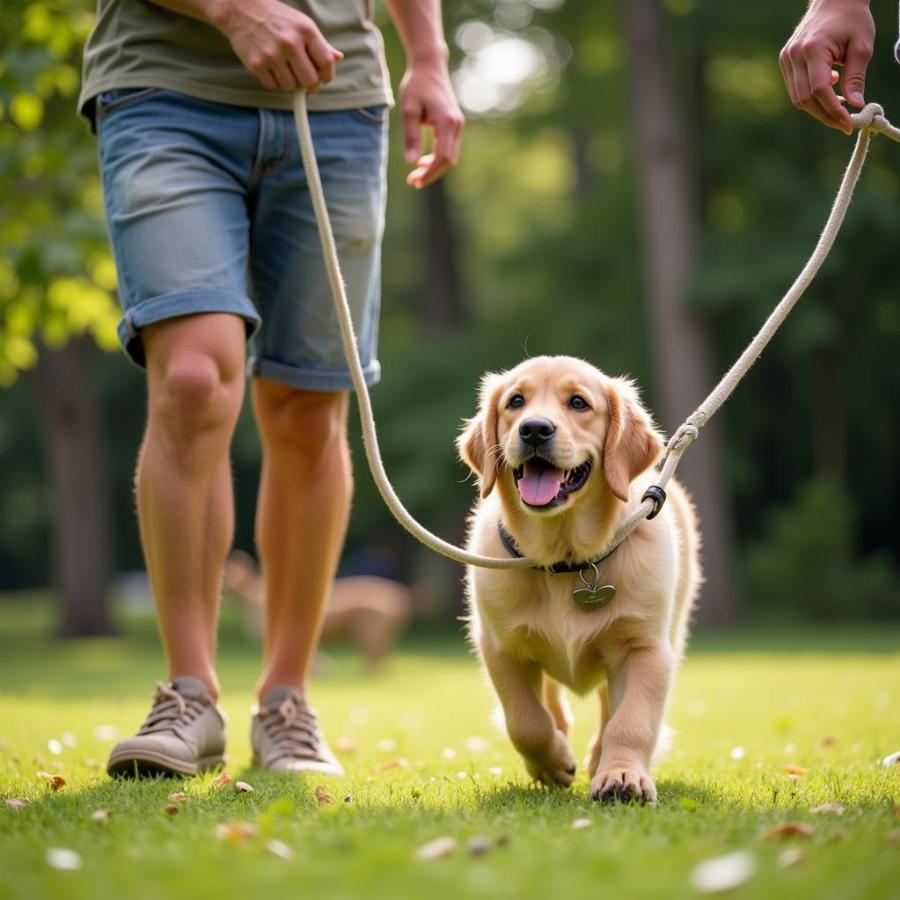Everyday dog training is more than just teaching your furry friend a few tricks; it’s about building a strong, loving bond based on trust and understanding. It’s about nurturing their innate intelligence and helping them become the best versions of themselves. This journey starts with recognizing that learning happens every single day, in every interaction you have with your dog.
Understanding Everyday Dog Training
Every interaction, from mealtime to playtime, presents a valuable opportunity for learning. The way you respond to your dog, the boundaries you set, and the activities you share all contribute to their understanding of the world and their place in it. This is the essence of everyday dog training – a holistic approach that blends seamlessly into your daily routine, making learning a fun and rewarding experience for both you and your canine companion.
The Benefits of Everyday Training
Why is this approach so beneficial? Here are a few key reasons:
- Stronger Bond: Consistent, positive interactions build trust and strengthen the bond between you and your dog.
- Improved Communication: Through everyday training, you learn to understand your dog’s body language and they learn to interpret your cues, leading to clearer communication.
- Behavioral Harmony: Addressing potential issues early on through everyday training helps prevent the development of unwanted behaviors.
- Mental Stimulation: Training keeps your dog mentally engaged, reducing boredom and its associated problems.
- Enhanced Well-being: A well-trained dog is a confident, happy dog, better equipped to navigate the world and enjoy life to the fullest.
Practical Tips for Everyday Dog Training
Ready to embark on this rewarding journey? Here are some practical tips to integrate everyday training into your life:
1. Turn Mealtime into Training Time:
Instead of simply filling their bowl, use mealtimes to practice basic commands like “sit” or “stay” before you give the food. This helps your dog associate good behavior with positive reinforcement.
2. Leash Training on Every Walk:
Every walk is a chance to practice loose-leash walking. Use positive reinforcement, rewarding your dog for staying by your side, to make walks enjoyable for both of you.
 Dog on Leash During Walk
Dog on Leash During Walk
3. Incorporate Training into Playtime:
Fetch isn’t just about exercise; it’s a fantastic opportunity to practice commands like “drop it” or “wait”. Make training a fun part of playtime to keep your dog engaged.
4. Reward Calm Behavior:
In the hustle and bustle of daily life, it’s easy to overlook calm behavior. Make a conscious effort to reward your dog when they are relaxed and settled. This encourages them to choose calmness over excitement.
5. Be Consistent:
Consistency is key to success in everyday dog training. Use the same commands, cues, and rewards to avoid confusion and reinforce desired behaviors.
6. End Training Sessions on a Positive Note:
Always end training sessions on a high note with praise, a treat, or a fun game. This leaves your dog feeling good about learning and eager for the next session.
Troubleshooting Common Challenges
Even with the best intentions, challenges can arise. Here are a few common issues and how to address them:
-
Dog Gets Distracted Easily: If your dog is easily distracted, try training in a quieter environment with fewer distractions. Gradually increase the level of distraction as your dog progresses.
-
Lack of Motivation: Some dogs are less food motivated. Experiment with different types of treats or use toys as rewards.
-
Frustration or Boredom: If your dog seems frustrated or bored, it’s time to reassess your training methods. Are the sessions too long? Are the exercises too challenging? Keep training sessions short, fun, and rewarding.
Seeking Professional Guidance
While everyday dog training is highly effective, there may be times when professional guidance is beneficial. If you encounter persistent challenges or wish to delve into more specialized training, don’t hesitate to seek help from a certified dog trainer. They can provide personalized advice and support tailored to your dog’s specific needs.
Conclusion
Everyday dog training is an enriching journey for both you and your furry friend. By embracing this approach, you’re not just teaching commands; you’re cultivating a deeper bond, fostering clear communication, and nurturing your dog’s full potential. Remember, every interaction is an opportunity for learning and growth. So, embrace the moments, celebrate the progress, and enjoy the incredible journey of everyday dog training!
FAQs About Everyday Dog Training
1. When should I start everyday dog training?
It’s never too early to start! You can begin incorporating basic training principles from the moment you bring your puppy home.
2. Can I use everyday training for older dogs?
Absolutely! Older dogs can benefit greatly from everyday training. It keeps their minds sharp and helps reinforce good behavior.
3. How long should training sessions be?
Keep training sessions short and sweet, especially for puppies and younger dogs. Five to ten minutes at a time is a good starting point.
4. What if my dog makes mistakes?
Mistakes are part of the learning process. Stay patient, avoid punishment, and redirect your dog to the desired behavior.
5. Is it ever too late to start training my dog?
It’s never too late! While younger dogs may learn quicker, older dogs are capable of learning new tricks and behaviors with patience and positive reinforcement.
Explore More Dog Training Resources
Interested in diving deeper into the world of dog training? Check out these helpful articles:
- [Link to article about positive reinforcement training]
- [Link to article about dog body language]
- [Link to article about choosing the right dog trainer]
Beaut Dogs is your trusted source for all things dog-related. We’re dedicated to providing valuable insights, expert advice, and a supportive community for dog lovers everywhere. Need personalized support? Don’t hesitate to reach out to us at [email protected]. We’re here to help you navigate the joys and challenges of dog ownership with confidence and compassion.